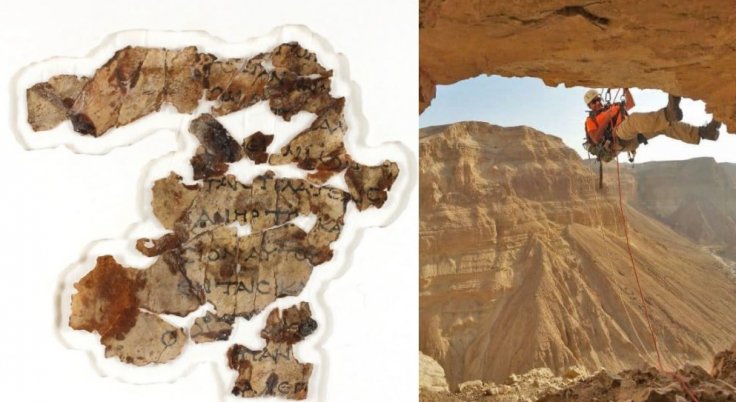A lost biblical manuscript discovered in 1878 was termed as forgery and had led to the suicide of antique dealer Moses Wilhelm Shapira. But now, after studying it for years, Israeli scholar Prof. Idan Dershowitz has said that the manuscript was authentic. He also said that this might be the most ancient biblical scroll ever known in the modern era.
Dershowitz, chair of Hebrew Bible and Its Exegesis at the University of Potsdam in Germany, has elaborately written about his study of the manuscript in his book The Valediction of Moses. "I heard stories about the Shapira affairs, and I found them interesting. After a couple of years, I became curious to see the text of the manuscripts," he said.

"The transcription by Shapira, which I found in an archive in Berlin, also offers important proof that he did not forge the manuscripts. You can see that he was studying them hard, trying to figure out all sorts of things, writing questions in the margin. If he had created them, he would have not needed to do something like this," Dershowitz stated
What is Shapira Affairs?
In 1878, an antique dealer named Moses Wilhelm Shapira got linen-wrapped ancient parchments uncovered by Bedouin tribe in a desert cave by the Dead Sea.
Shapira was a Russian Jew converted to Christianity, who had opened a souvenir and antique store in Jerusalem. Shapira took interest in the manuscript as it looked somewhat similar to the Book of Deuteronomy. He offered the findings to the British Museum where it was exhibited and became popular.
However, French Orientalist and diplomat Charles Simon Clermont-Ganneau declared publicly that the documents were forgeries. This led to criticism and Shapira committed suicide.
"If Deuteronomy as we know it, according to most scholars, dates back to the end of the First Temple period, this version must be even more ancient," said Dershowitz, who has a doctorate in biblical studies from the Hebrew University of Jerusalem.
80 Dead Sea Scrolls Found in Desert Cave
Archaeologists from Israel recently found 80 parchments of Dead Sea scrolls inside a desert cave in Jerusalem. The scrolls are said to be hidden by Jews during Bar Kochba Revolt against Roman Empire in 1st century CE. On the basis of style of writing, the new scrolls are dated to the 3rd century BCE to 1st century CE.
Dead Sea scrolls are said to be the second oldest surviving Hebrew Bible manuscript. The first set of scrolls were found in the 1940s. The desert cave where the new parchments were discovered is situated in a remote area about 40km south of Jerusalem. Interestingly, about 40 human skeletons were discovered from this cave in 1960s, after which it was called as the Cave of Horror.
Roman Encampment
There is evidence to Roman encampments on the cliff above this cave. Thus, historians say that the rebels who went into hiding with scrolls and artefacts could not come out as the place was laid siege by the Roman army and the people died inside of starvation. Even to this day, the only access to the cave is by rope. One has to use the rope for at least 200 feet to enter the cave.
Reports claim that Israel Antiquities Authority, which carried out the excavations, is of the opinion that the newly found scroll is a missing part of the "Book of the 12 Minor Prophets" scroll, which was discovered in 1961.
Multiple Discoveries
The announcement of finding of more Scrolls was made during the press conference. Authorities said that the archaeologists had also made multiple discoveries along with the scrolls. They have also found a 10,000-year-old woven basket, a 6,000-year-old mummified skeleton of a child, Roman era footwear and bronze coins. The coins seemed to be affected by armed conflict and struck by arrowheads.
New piece of Dead Sea Scrolls jigsaw discovered after 60 years
— Ivandro Alves (@IvandroAlves1) March 17, 2021
A recently-discovered scroll fragment of an ancient biblical text is seen at Israel Antiquities Authority laboratories in Jerusalem March 16, 2021.https://t.co/UZhfzk9DZR pic.twitter.com/CdqaWqn4qu
Israel Antiquities Authority conservator Tanya Bitler shows newly discovered Dead Sea Scroll fragments at the Dead Sea Scrolls conservation lab in Jerusalem, March 16, 2021. pic.twitter.com/1am4D8mYJb
— Gregory Harshfield (@HarshfieldGreg) March 16, 2021
These discoveries are said to be of religious, cultural, historic, and linguistic importance. The scrolls contain lines of Greek text from the Hebrew Bible. It is said that the Jews failed to win the Bar Kochba revolt [held between 132 CE and 136 CE] and had hidden the Hebrew text inside the cave to keep it safe from the Romans.
Israel has over 500 caves and this cave is under probe since 2016. The probe started when authorities found the scrolls being sold in the black market. Israel Antiquities Authority is trying to recover ancient artefacts along with scrolls.
Joe Uziel, head of the antiquities authority's Dead Sea Scrolls unit spoke to Associated Press about the differences in writing. "When we think about the biblical text, we think about something very static. It wasn't static. There are slight differences and some of those differences are important," Uziel said.









